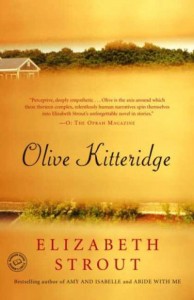Strout, Elizabeth (2008). Olive Kitteridge. New York: Random House.
This Pulitzer prize-winner is offered as a novel, but it is actually a collection of thirteen short stories. What they have in common is that their characters all live in a small town in Maine. Some characters, especially Olive, a retired schoolteacher, appear in several stories, but the only sense in which the set constitutes a novel is that by the end, you have some sense of what it’s like to live in this particular small town. The stories just barely hang together as a whole.
Each story offers a slice-of-life situation for one or two main characters, during which their motivation, hopes, and doubts are revealed by interactions with others. Olive, the character who appears most often, is a blunt, unsentimental, angry, fearful, and un-self-aware person who nevertheless shows moments of kindness and human connectedness. She’s an interesting, though not likeable character.
The characters in these stories are typically not self-aware, which sets up the author’s technique of letting the reader “discover” their psychology from their behavior. It’s a proper method in fiction, but in this collection, the obviousness of the manipulation grows tedious. Reading about small-minded characters, doing and saying dim-witted things in a tradition-bound society, grates on one’s tolerance, so when a character actually does something, like make a decision, it stands out as the dramatic highlight of the story.
The stories are extremely well-crafted, however, and enjoyable for that. All are third-person-close, and Strout always starts a story with the narrator speaking omnisciently, usually in formidable descriptive sentences, then she manages to insert the narrator’s close voice very subtly. For example, describing Olive’s husband, Henry, she opens with a past-tense narrative description.
“For many years Henry Kitteridge was a pharmacist in the next town over, driving every morning on snowy roads, or rainy roads, or summertime roads, when the wild raspberries shot their new growth in brambles along the last section of town before he turned off to where the wider road led to the pharmacy.”
Strout opens almost every story with description of the scenery, which works because the description is always emotionally connected to a character. She’s not simply telling about the road and the raspberries, which would be boring. Rather, she’s explaining through Henry’s eyes, how he sees it as he drives to work. Connecting description to the character’s experience makes it live, and Strout is a master of the technique.
She continues in the very next sentence with a remarkable bit of sorcery:
“Retired now, he still wakes early and remembers how mornings used to be his favorite, as though the world were his secret, tires rumbling softly beneath him and the light emerging through the early fog, the brief sight of the bay off to his right, then the pines, tall and slender, and almost always he rode with the window partly open because he loved the smell of the pines and the heavy salt air, and the in the winter he loved the smell of the cold.”
The shift from past to present tense at the start of the second sentence is the narrator’s nod to the reader that we’re moving in close now: “Retired now, he still wakes early…” If that little tense change weren’t there, you would have the impression that the story was being told by nobody in particular; that it was some kind of a self-telling story. The tense change creates an aside, a brief break from narrative description for a parenthetical, intimate comment to the reader, as if to say: “Henry was a pharmacist for many years, but, you know, he’s retired now…” So you immediately feel trust and intimacy with the narrator, which pulls you into the world of the story.
Then over the remainder of that second sentence, Strout imperceptibly moves the narrator back to past tense, retreating her into the background so we can focus on Henry. She does it by describing, at first in present tense, what Henry remembers, “…how mornings used to be…” which is brilliant, because all memory is past tense, so you don’t notice the shift. By the end of that sentence, the narrator has switched fully back to past tense description, beginning with the conjunctive second clause, “…and almost always he rode with the window partly open…” The transition is seamless. When I see writing that skillful, I want to clap my hands and shout, “Bravo!”
And there’s a lot more where that came from. Often the characterizations are exquisitely subtle, with the surface description telling another, subterranean tale.
“Olive had refused to go to church the day before and Henry, uncharacteristically, had spoken to her sharply. ‘Is it too much to ask,’ he had found himself saying, as he stood in the kitchen in his undershorts, ironing his trousers. ‘A man’s wife accompanying him to church?’ Going without her seemed a public exposure of familial failure. ‘Yes it most certainly is too goddamn much to ask!’ Olive had almost spit, her fury’s door flung open.”
It’s a scene about loneliness and alienation while maintaining social persona. The narrator explains why Henry is upset, because Henry himself doesn’t quite know why. It seemed like “…a public exposure of familial failure.”
And notice how Henry, who is very mild-mannered, doesn’t actually say his piece. He “found himself saying…” as if he were dissociated from his own thoughts and actions, which is a fair description of his unreflective personality.
The whole book is like that, a coruscation of writerly brilliance. So despite my disdain for the stories themselves, the quality of the writing easily redeems the book for me.

